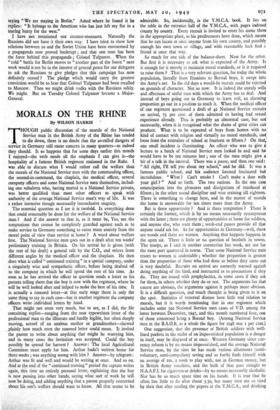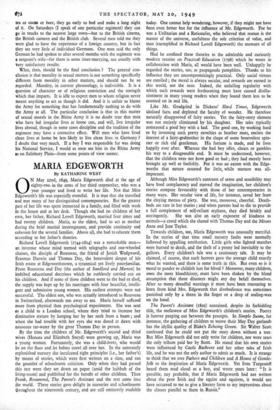MORALS ON THE RHINE
By WILSON HARRIS
THOUGH public discussion of the morals of the National Service man in the British Army of the Rhine has tended to die down, there is no doubt that the so-called dangers of service in Germany still cause concern in many quarters—as indeed they should. It so happens that for some days earlier this month I enjoyed—the verb needs all the emphasis I can give it—the hospitality of a famous British regiment stationed in the Ruhr. I was able to discuss what I would rather call the welfare than the morals of the National Service men with the commanding officer, the second-in-command, the chaplain, the medical officer, several company officers and some National Service men themselves, includ- ing one subaltern who, having started as a National Service private, was better qualified than most other officers to speak with authority of the average National Service man's way of life. It was a rather intensive though necessarily inconclusive enquiry.
The essential question as I see it is twofold. Is everything done that could reasonably be done for the welfare of the National Service man ) And if the answer to that is, as it must be, Yes, are the temptations that cannot be completely guarded against such as to make service in Germany something to cause more anxiety from the moral point of view than service at home ? A word about welfare first. The National Service man goes out in a draft after ten weeks' preliminary training in Britain. On his arrival he is given (with the rest of his draft) a general talk by the C.O., and others from different angles by the medical officer and the chaplain. He then does what is called "continued training" in a special company, under a singularly wise and sympathetic officer, before being drafted off to the company in which he will spend the rest of his time. his soon as he has arrived the officer in question sends a letter to his parents telling them that the boy is now with the regiment, where he will be well looked after and helped to make the best of his time. It is actually a roneoed letter—at that early stage there is only the same thing to say in each case—but in another regiment the company officers write individual letters by hand.
That might not seem very much, but to see, as I did, the file containing replies—ranging from the neat typewritten letter of the professional man to the illiterate and hardly legible, but often deeply moving, scrawl of an anxious mother or grandmother—showed plainly how much even the roneoed letter could mean. It invited the parent to write about anything that might be worrying him, and in many cases the invitation was accepted. Could the boy possibly be spared for harvest ? Answer : The local Agricultural Committee must apply for him. Arthur hadn't written home for three weeks ; was anything wrong with him ? Answer—by telegram: Arthur was fit and well and would be writing at once. And so on. And at the end of the "continued training" period the captain writes again, this time an entirely personal letter, explaining that the boy is now passing into other hands, saying what sort of work he will now be doing, and adding anything that a parent properly concerned about his son's welfare should want to know. All that seems to be admirable. So, incidentally, is the Y.M.C.A. book. It lies on the table in the entrance hall of the Y.M.C.A., with pages indexed county by county. Every recruit is invited to enter his name there in the appropriate place, as his predecessors have done, which means that he can locate at once anyone from his own county, and possibly enough his own town or village, and with reasonable luck find a friend at once that way.
So much for one side of the balance-sheet. Now for the other. But first it is necessary to ask what is expected of the Army. Is it enough for it merely to maintain moral standards, or is it required to raise them ? That is a very relevant question, for today the whole population, literally from Etonians to Borstal boys, is swept into the Army's net. In the old days a would-be recruit could be rejected on grounds of character. Not so now. It is indeed the unruly wills and affections of sinful men with which the Army has to deal. And instead of boys going out to Germany to learn evil, an alarming proportion go out in a position to teach it. When the medical officer of one regiment questioned a draft of 42 National Service recruits on arrival, 75 per cent, of them admitted to having had sexual experience already. This is probably an abnormal case, but not necessarily, when it is recognised what the shims of great cities can produce. What is to be expected of boys from homes with no kind of contact with religion and virtually no moral standards, cast, loose from the restraints of school at fourteen or fifteen ? On that' one small incident is illuminating. An officer who was to give A lecture to a batch of National Service men looked in and said ha would have to be ten minutes late ; one of the men might give a bit of a talk in the interval. There was a pause, and then one said: "All right, MI tell you about my school," and he did. It was a famous public school, and his audience listened fascinated but incredulous. " What ? Can't smoke ? Can't make a date with your girl ? " And so forth. The two nations. In the one case emancipation into the pleasures and dissipations of manhood at fifteen ; in the other sound discipline and wise training till eighteen. There is something to change here, and in the matter of morals the home is answerable for ten times more than the Army.
But is there opportunity ? And is there temptation ? There is certainly the former, which is by no means necessarily synonymous with the latter ; there are plenty of opportunities at home for soldiers, and anyone else, who want them ; week-end passes provide all that anyone could ask for. As for opportunities in Germany—well, there are woods and there are women. Anything that happens happens in the open air. There is little or no question of brothels in towns. The troops, as I said in another connection last week, are not for the most part quartered in towns. That some National Service men resort to women is undeniable ; whether the proportion is greater than the proportion of those who had done so before they came out is very doubtful. Recruits on arrival are earnestly warned againit doing anything of the kind, and instructed as to precautions if they do. They are issued with prophylactics, in some cases if they ask for them, in others whether they do or not. The arguments for that course are obvious, the arguments against it perhaps more obvious. It is a difficult question, and much thought is being given to it on the spot. Statistics of venereal disease have little real relation to morals, but it is worth mentioning that in one regiment which includes some soo National Service men cases of V.D. among tha latter between December, 1947, and this month numbered four, Ontl of those concerned being a Borstal boy. (Among National Service men in the BA.O.R. as a whole the figure for 1948 was a per cent.)
One suggestion, that the presence of British soldiers with well- lined pockets in the midst of an impoverished population is a danger in itself, may be disposed of at once. Western Germany since cur- rency reform is by no means impoverished, and the average National Service man, by the time he has made various allotments (semi- voluntary, semi-compulsory saving and so forth) finds himself with an average of Los. a week to play with, not in German money, but in British Army vouchers, and the bulk of that goes straight to N.A.A.F.I. for cigarettes or drinks—by no means necessarily alcoholic. Nor has he so much spare time on his hands. It is true that he often has little to do after about 5.30, but many men are so tired by then that after reading the papers at the Y.M.C.A., and drinking tea or cocoa or beer, they go early to bed and make a long night of it. On Saturdays (I speak of one particular regiment) they can go in trucks to the nearest large town—but to the British cinema, the British canteen and the British club. Several men told me they were glad to have the experience of a foreign country, but in fact they see very little of individual Germans. One man said the only German he had spoken to after several months with the regiment was a sergeant's wife—for there is some inter-marrying, not usually with Very satisfactory results.
What, then, should be the final conclusion ? The general con- clusion is that morality in sexual matters is_not something specifically different from morality in other matters, and should not be so regarded. Morality, in current phraseology, is indivisible. It is a question of character or of religious conviction and the strength which that imparts. It is idle to expect men to whom religion never meant anything to act as though it did. And it is unfair to blame the Army for something that has fundamentally nothing to do with the Army at all. The particular conclusion is that in this matter of sexual morals in the Rhine Army it is no doubt true that men who have led irregular lives at home can, and will, live irregular lives abroad, though in some cases discipline and the tradition of the regiment may have a corrective effect. Will men who have lived dean lives at home be less likely to live clean lives in Germany ? I doubt that very much. If a boy I was responsible for was doing his National Service, I would as soon see him in the Rhine Army as on Salisbury Plain—from some points of view sooner.











































 Previous page
Previous page